Abstract
AV3 cells (continuous human amnion) infected with the Onderstepoort strain of canine distemper virus produced cell fusion within 2 to 5 hr when added to AV3 cell monolayers. An apparent requirement for intact, infected cells was demonstrated by showing that (i) frozen-and-thawed infected cells failed to induce fusion, (ii) infected cells frozen in the presence of glycerol retained their ability to induce fusion, (iii) infected cells subjected to swelling in hypotonic buffer and homogenization lost their ability to fuse cells, and (iv) semipurified and concentrated virus preparations with infectivity titers as high as 107.5 mean tissue culture doses per ml failed to induce fusion within 5 hr. Preparations of intact, infected cells had a mean log10 ratio of infectivity to fusion activity of 3.6. Treatment with beta-propiolactone rendered the active preparations free from detectable infectivity while they retained their ability to cause cell fusion. Cycloheximide did not block the formation of syncytia in assay cells. This type of cell fusion was neutralized by canine distemper virus immune antisera, and measles virus immune sera showed a slight degree of cross-neutralization. Other cell lines, HEp-2, MA 139 (embryonic ferret lung), MA 104 (embryonic rhesus monkey kidney), and Vero (African green monkey kidney) were also susceptible.
Full text
PDF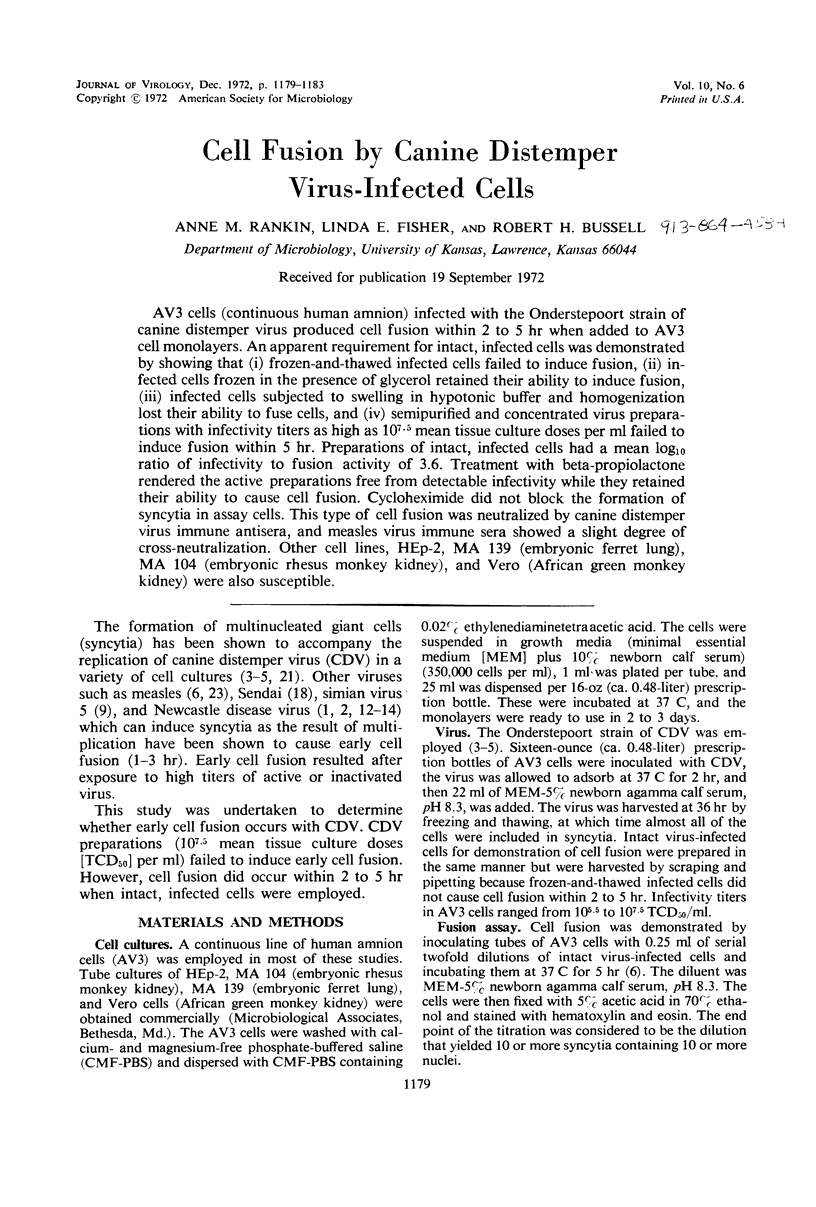
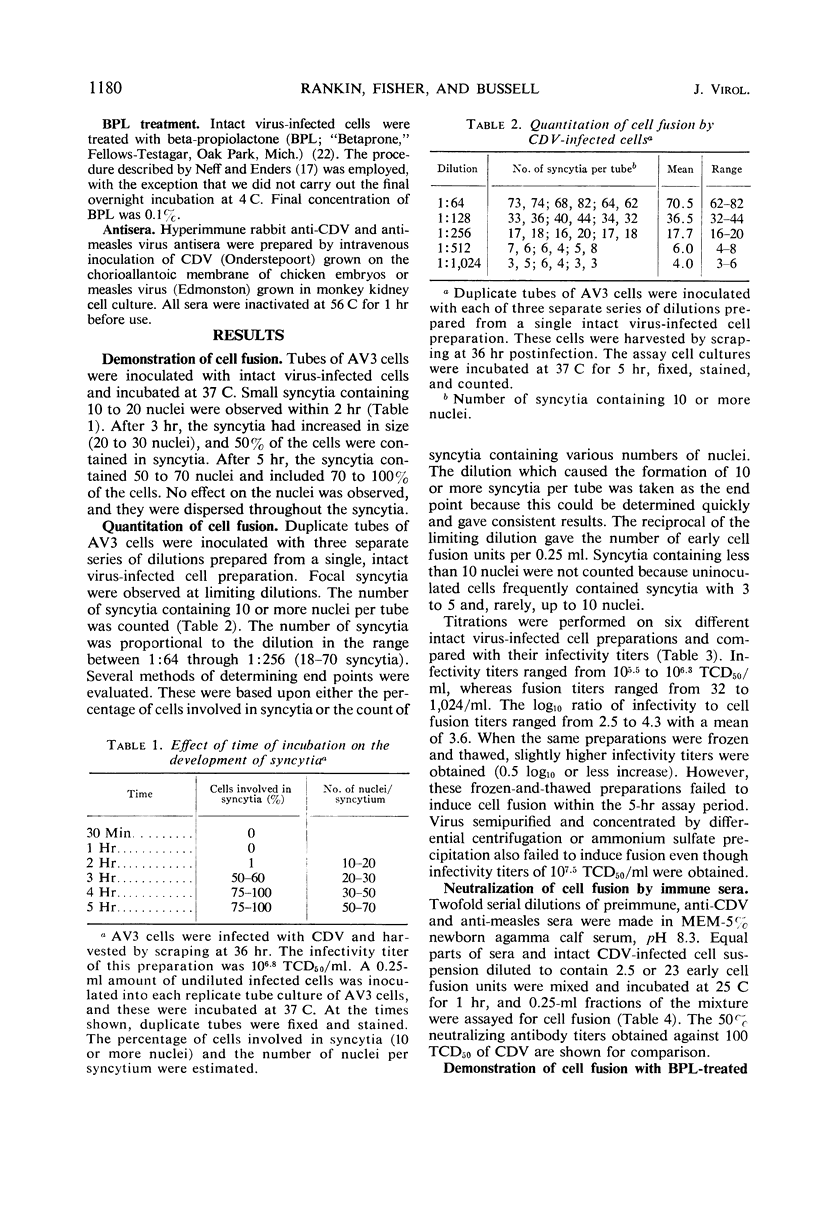
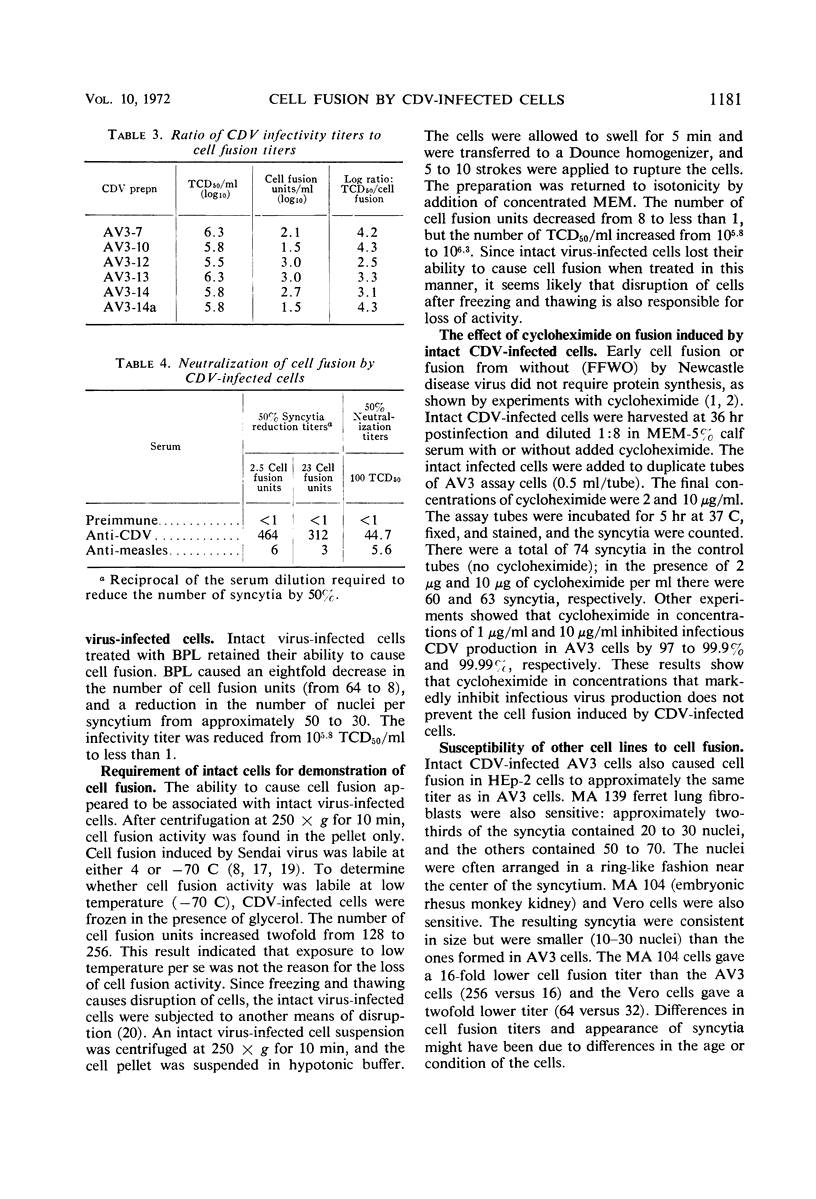
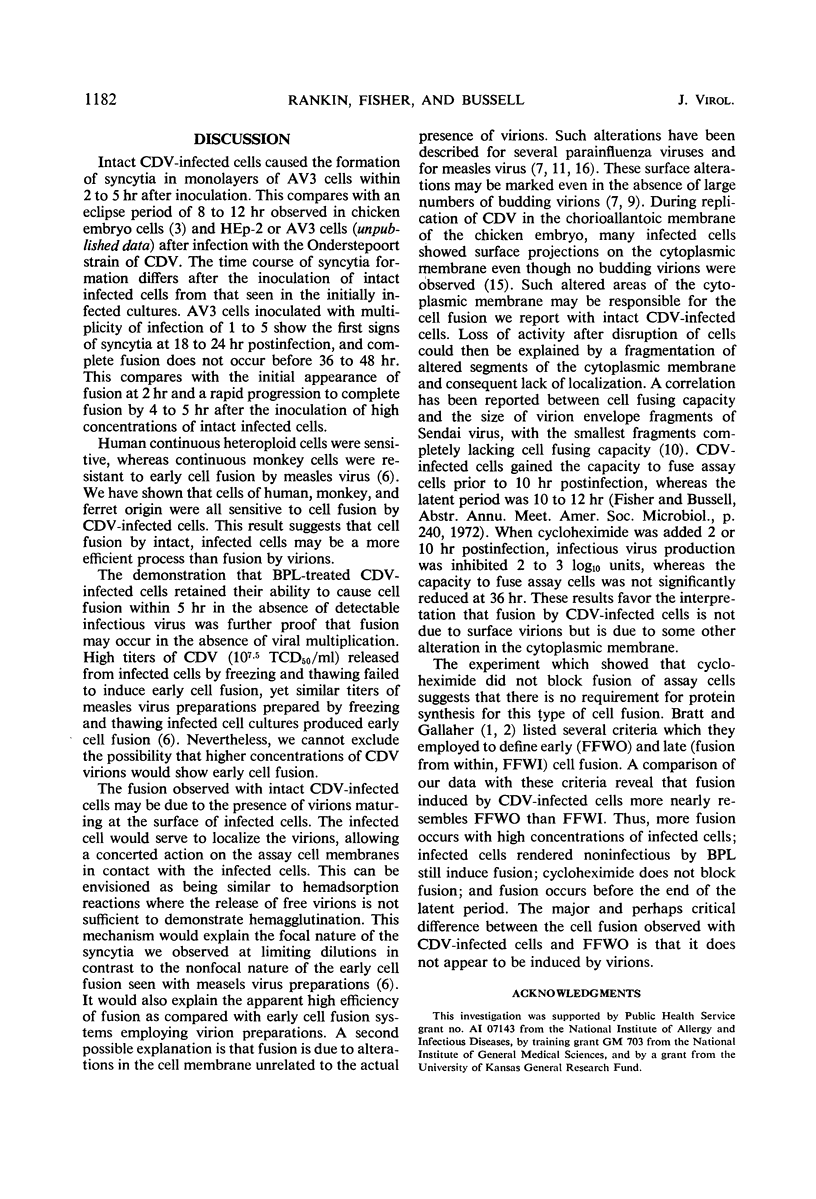
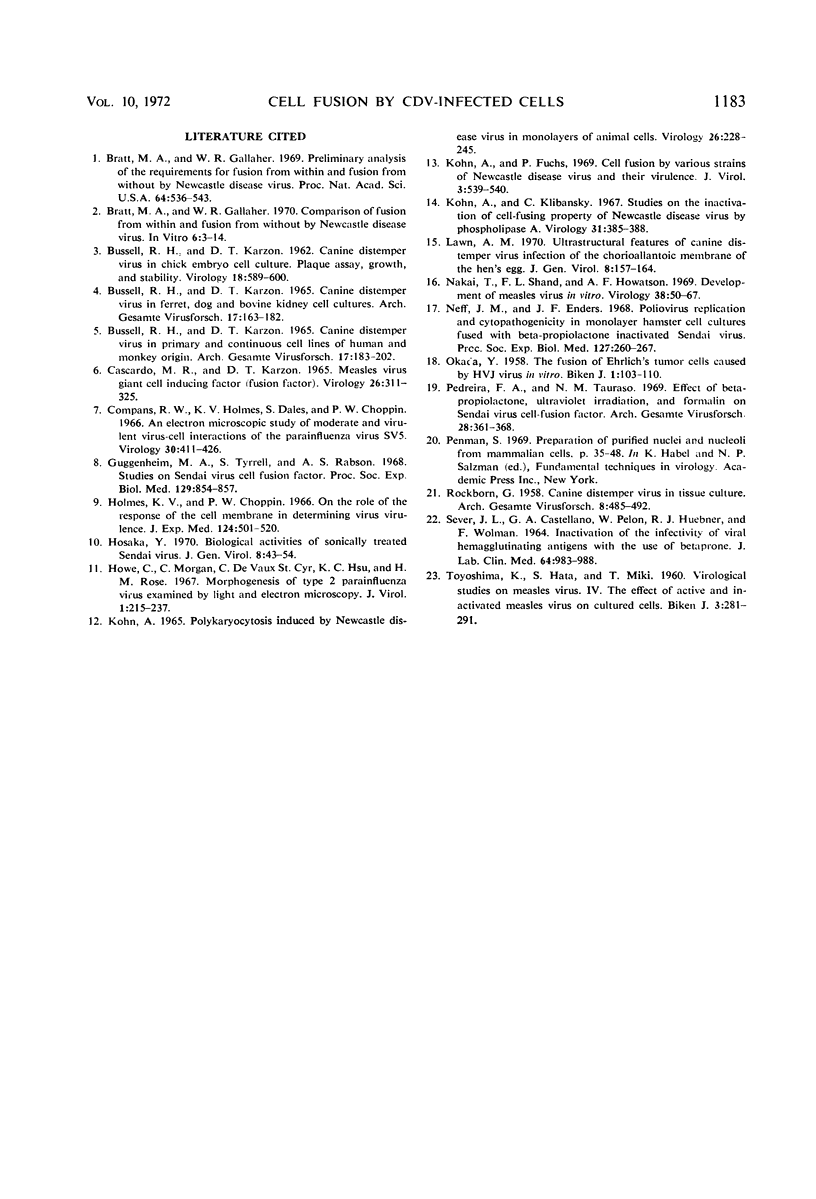
Selected References
These references are in PubMed. This may not be the complete list of references from this article.
- BUSSELL R. H., KARZON D. T. Canine distemper virus in chick embryo cell culture. Plaque assay, growth, and stability. Virology. 1962 Dec;18:589–600. doi: 10.1016/0042-6822(62)90062-4. [DOI] [PubMed] [Google Scholar]
- Bratt M. A., Gallaher W. R. Comparison of fusion from within and fusion from without by Newcastle disease virus. In Vitro. 1970 Jul-Aug;6(1):3–14. doi: 10.1007/BF02616129. [DOI] [PubMed] [Google Scholar]
- Bratt M. A., Gallaher W. R. Preliminary analysis of the requirements for fusion from within and fusion from without by Newcastle disease virus. Proc Natl Acad Sci U S A. 1969 Oct;64(2):536–543. doi: 10.1073/pnas.64.2.536. [DOI] [PMC free article] [PubMed] [Google Scholar]
- Bussell R. H., Karzon D. T. Canine distemper virus in ferret, dog and bovine kidney cell cultures. Arch Gesamte Virusforsch. 1965;17(2):163–202. doi: 10.1007/BF01267904. [DOI] [PubMed] [Google Scholar]
- CASCARDO M. R., KARZON D. T. MEASLES VIRUS GIANT CELL INDUCING FACTOR (FUSION FACTOR). Virology. 1965 Jun;26:311–325. doi: 10.1016/0042-6822(65)90279-5. [DOI] [PubMed] [Google Scholar]
- Compans R. W., Holmes K. V., Dales S., Choppin P. W. An electron microscopic study of moderate and virulent virus-cell interactions of the parainfluenza virus SV5. Virology. 1966 Nov;30(3):411–426. doi: 10.1016/0042-6822(66)90119-x. [DOI] [PubMed] [Google Scholar]
- Guggenheim M. A., Tyrrell S., Rabson A. S. Studies on Sendai virus cell fusion factor. Proc Soc Exp Biol Med. 1968 Dec;129(3):854–857. doi: 10.3181/00379727-129-33441. [DOI] [PubMed] [Google Scholar]
- Holmes K. V., Choppin P. W. On the role of the response of the cell membrane in determining virus virulence. Contrasting effects of the parainfluenza virus SV5 in two cell types. J Exp Med. 1966 Sep 1;124(3):501–520. doi: 10.1084/jem.124.3.501. [DOI] [PMC free article] [PubMed] [Google Scholar]
- Hosaka Y. Biological activities of sonically treated Sendai virus. J Gen Virol. 1970 Jul;8(1):43–54. doi: 10.1099/0022-1317-8-1-43. [DOI] [PubMed] [Google Scholar]
- Howe C., Morgan C., de Vaux St Cyr C., Hsu K. C., Rose H. M. Morphogenesis of type 2 parainfluenza virus examined by light and electron microscopy. J Virol. 1967 Feb;1(1):215–237. doi: 10.1128/jvi.1.1.215-237.1967. [DOI] [PMC free article] [PubMed] [Google Scholar]
- KOHN A. POLYKARYOCYTOSIS INDUCED BY NEWCASTLE DISEASE VIRUS IN MONOLAYERS OF ANIMAL CELLS. Virology. 1965 Jun;26:228–245. doi: 10.1016/0042-6822(65)90050-4. [DOI] [PubMed] [Google Scholar]
- Kohn A., Fuchs P. Cell fusion by various strains of Newcastle disease virus and their virulence. J Virol. 1969 May;3(5):539–540. doi: 10.1128/jvi.3.5.539-540.1969. [DOI] [PMC free article] [PubMed] [Google Scholar]
- Kohn A., Klibansky C. Studies on the inactivation of cell-fusing property of Newcastle disease virus by phospholipase A. Virology. 1967 Feb;31(2):385–388. doi: 10.1016/0042-6822(67)90183-3. [DOI] [PubMed] [Google Scholar]
- Lawn A. M. Ultrastructural features of canine distemper virus infection of the chorioallantoic membrane of the hen's egg. J Gen Virol. 1970 Sep;8(3):157–164. doi: 10.1099/0022-1317-8-3-157. [DOI] [PubMed] [Google Scholar]
- Nakai T., Shand F. L., Howatson A. F. Development of measles virus in vitro. Virology. 1969 May;38(1):50–67. doi: 10.1016/0042-6822(69)90127-5. [DOI] [PubMed] [Google Scholar]
- Neff J. M., Enders J. F. Poliovirus replication and cytopathogenicity in monolayer hamster cell cultures fused with beta propiolactone-inactivated Sendai virus. Proc Soc Exp Biol Med. 1968 Jan;127(1):260–267. doi: 10.3181/00379727-127-32668. [DOI] [PubMed] [Google Scholar]
- Pedreira F. A., Tauraso N. M. Effect of beta-propiolactone, ultraviolet irradiation, and formalin on sendai virus cell-fusion factor. Arch Gesamte Virusforsch. 1969;28(3):361–368. doi: 10.1007/BF01240950. [DOI] [PubMed] [Google Scholar]
- SEVER J. L., CASTELLANO G. A., PELON W., HUEBNER R. J., WOLMAN F. INACTIVATION OF THE INFECTIVITY OF VIRAL HEMAGGLUTINATING ANTIGENS WITH THE USE OF BETAPRONE. J Lab Clin Med. 1964 Dec;64:983–988. [PubMed] [Google Scholar]


